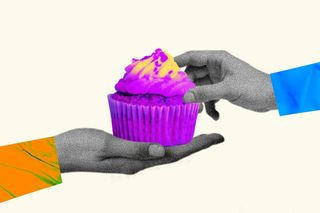
People Underestimate How Much Random Acts of Kindness Mean to Others, Finds Study
“It [also] turns out generosity can actually be contagious… Kindness can actually spread,” the researchers concluded.

Randomly sending cupcakes to colleagues, or soup to a sick friend living away from home, are understated gestures of love. Yet, they probably make people happier than we ever realize. New research suggests that people routinely underestimate how much their small, random acts of kindness — like helping a neighbor carry their grocery upstairs, offering to pet-sit for an acquaintance, or simply, remembering to call an elderly relative on their birthday — can bring joy to others.
“People aren’t way off base… They get that being kind to people makes them feel good. What we don’t get is how good it really makes others feel,” noted the study’s first author, Amit Kumar, an assistant professor of marketing and psychology at the University of Texas at Austin.
Published in the Journal of Experimental Psychology: General, the study suggests that people’s “miscalibrated expectations” about how much their gesture will be appreciated, can keep them from engaging in prosocial behaviors like helping, sharing, or donating.
The researchers arrived at their findings through a series of experiments. One involved asking people at a park whether they wanted to give away a cup of hot chocolate from the kiosk to a stranger, or keep it for themselves. An overwhelming majority of the participants chose to give it away, but they didn’t expect their gesture to cause nearly the same degree of emotional splash (pun not intended) it ended up creating.
In another leg of the experiment,some participants received cupcakes from the researchers as part of the study as a token of gratitude for participating in the study. Others received the same cupcakes, but through acts of kindness — basically, much like in the previous experiment, a fraction of participants were asked if they’d like to have their cupcakes, or give them away. Turns out, people who received their cupcakes as a result of the kindness of other participants were actually much happier upon receiving them.
Related on The Swaddle:
Why Stress Makes the Most Empathetic People Less Kind
The researchers believe this is because recipients of an act of kindness tend to focus more on the warm feeling the gesture exudes, rather than on the object they receive. “Performers are not fully taking into account that their warm acts provide value from the act itself… The fact that you’re being nice to others adds a lot of value beyond whatever the thing is,” Kumar added.
While the person may fret about what to give, the idea is the person on the other side is more likely to focus on the act of kindness, rather than how it is packaged.
Andkindness doesn’t just benefit its recipients. People performing acts of kindness also stand to gain from it, albeit intangibly.
“[K]indness can promote gratitude. You are kind to others in need; having that awareness then heightens the sense of your own good fortune. Kindness promotes empathy and compassion; which, in turn, leads to a sense of interconnectedness with others… When you feel connected with others, you lessen alienation,” psychologists Shoba Sreenivasan and Linda Weinberger had written in Psychology Today. Research also suggests that the more spontaneous one’s act of kindness is, the more happiness it results in.
By enhancing feelings of confidence and optimism, kindness can help combat depression, too. “Kindness is potent in strengthening a sense of community and belonging,” Sreenivasan and Weinberger note.
Related on The Swaddle:
Surviving the Pandemic Has Made Us Kinder, More Aware of Mental Health. Will It Last?
Being kind benefits our physical health as well — by lowering cortisol the “stress hormone.” Past research on older adults suggests that when people spend money on others rather than themselves, they also report lower blood pressure. Not only that, but it can lower the perception of pain, too.
“Humans are extremely social, we have better health when we are interconnected, and part of being interconnected is giving,” Tristen Inagaki, a neuroscientist had told BBC News in 2020. “There is really something about just focusing on others sometimes that’s really good for you.”
While there is a link to happiness and contentment, kindness as a value is often disregarded, Sreenivasan and Weinberger argued, “This is because “kind people may be viewed as ‘enablers’ by some, or worse, as ‘suckers’ by the cynical… reflect[ing] a belief system that success is only achieved through stepping on or ignoring others. Yet, the cynic’s behavior rarely results in true happiness.” The present study debunks that perception to an extent.
Interestingly, in the present study, the researchers also explored the consequences of kindness — beyond just feeling happy — on the recipients. When asked to divide US$ 100 between themselves and a random stranger, recipients chose to pass the kindness forward — by being more generous in sharing. Evidently, small acts of kindness can spur a domino effect of sorts. That’s something India needs rather direly; just last year, the country ranked poorly last year in a global assessment of how kind people from different countries are, to strangers.
“It turns out generosity can actually be contagious… Kindness can actually spread,” concluded Kumar.
Devrupa Rakshit is an Associate Editor at The Swaddle. She is a lawyer by education, a poet by accident, a painter by shaukh, and autistic by birth. You can find her on Instagram @devruparakshit.
Related


Why Accusing Harry Styles of Queerbaiting May Be Flawed
